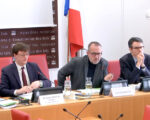>> Italy wrong to take child born to surrogate: ECHR
L’affaire concerne un couple italien stérile d’une cinquantaine d’années, habitant dans le nord du pays, qui désirait à tout prix avoir un enfant. Après avoir essuyé trois fois un refus des autorités compétentes d’adopter un enfant en Italie, ils se sont tournés vers l’Ukraine où ils ont trouvé une mère porteuse.
Le couple a payé 25.000 euros, selon La Stampa, et, quand l’enfant est né en Ukraine, en 2011, sa mère biologique a refusé d’inscrire son propre nom sur le certificat de naissance. Les deux époux se sont donc enregistrés à Moscou comme les parents du bébé.
Rentré en Italie, le couple a tenté de déclarer l’enfant au bureau d’état-civil mais la justice a découvert leur fraude et les a inculpés. La Cour de cassation italienne avait pris alors la décision d’éloigner le bébé du couple, estimant qu’un enfant né d’une mère porteuse en Ukraine ne pouvait rester auprès de ses parents italiens. Âgé alors de huit mois, il avait été placé sous tutelle dans une maison d’accueil, avant d’être confié, plus d’un an après, à une famille d’accueil.
La Cour suprême rappelle que “la loi italienne prévoit que la femme qui accouche est la mère et que la même loi contient une interdiction formelle, renforcée par une sanction pénale, de la gestation pour autrui”
Mais, la Cour européenne des droits de l’Homme vient de trancher, estimant dans sa décision que l’Italie a eu tort de séparer un enfant né d’une GPA à l’étranger de ceux qui souhaitaient en devenir les parents, même si ce couple avait agi dans l’illégalité.
Les juges de Strasbourg ne se sont pas prononcés dans leur arrêt sur la légitimité d’interdire la GPA, loin d’être une spécificité italienne. Mais ils ont considéré que “l’intérêt supérieur de l’enfant” concerné aurait dû être davantage pris en compte.
>> The European Court of Human Rights (ECHR) has condemned the Italian state for removing a child, who was born to a surrogate mother in Russia, from an Italian couple and ordered it to pay thousands of euros in compensation.
In a ruling on Tuesday, the court held that Italy violated the right of the married couple to recognize the child as their own, despite there being no biological tie.
Donatina Paradiso and Giovanni Campanelli, from Colletorto in Molise, turned to Rosjurconsulting, a Russian law firm specializing in reproductive law and surrogacy, after several failed attempts to conceive through IVF, the court said in its judgement.
The baby boy was born in Moscow in February 2011 to a surrogate mother via IVF.
The couple were registered as the baby’s parents, in accordance with Russian law, but without any indication that the child was born through surrogacy.
They were later provided with documents from the Italian Consulate in Moscow allowing the child to leave for Italy.
But when they attempted to register the birth in Colletorto, they were accused of fraud after the Italian Consulate informed authorities that information provided on the child’s birth certificate was incorrect.
A DNA test later that year revealed that Campanelli was not the child’s biological father. The couple claimed they were unaware that Campanelli’s semen had not been used in the Russian clinic.
Under Italian law, the person who gives birth to a baby is legally its mother, and the use of surrogate mothers is illegal.
In October 2011, Campobasso minors court ruled that the child be removed immediately from the couple and placed under guardianship, on the grounds there was “no biological relationship between them” and because there were doubts over the couple’s ability to raise a child.
The baby was placed in a children’s home, without Paradiso and Campanelli being informed of its location or allowed any contact, and in January 2013 it was entrusted to foster parents.
The child’s biological mother could not be traced.
In its ruling, the ECHR said the Italian state had violated Article 8 of the European Convention on Human Rights enshrining the right to respect for private and family life.
Although Paradiso and Campanelli, aged 48 and 60, respectively, had spent only six months with the baby, the court considered the period to have “covered important stages in his young life and they had behaved as parents towards him during that period”.
The court ordered the Italian state to pay the applicants €20,000 in respect of non-pecuniary damage and €10,000 in for costs and expenses.
However, the state is not obliged to return the child as he would have “developed emotional ties with his foster family”, the court said.


















